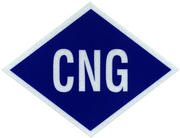FAQ
CNG
CNG stands for Compressed Natural Gas used for vehicles, because it cause less than other fuels, and also becuase of clean environment.
Why is CNG today's best alternative fuel?
- It’s Domestic: With fuel produced in Pakistan, increasing use of Natural Gas Vehicles (NGVs) reduces our foreign oil consumption, and enhances our nation’s energy security.
- It’s Clean: Compressed Natural Gas (CNG) and Liquefied Natural Gas (LNG) are two of the cleanest burning alternative fuels available. Natural gas vehicles emit up to 95% less pollution than gasoline or diesel vehicles.
- It’s Cheaper Than Gas or Diesel: Natural gas is less expensive than petroleum, which means reduced fuel costs for NGV operators.
- It’s Safe: Lighter-than-air compressed natural gas is non-toxic and disperses quickly. It has a higher ignition temperature than gasoline and diesel fuel, which reduces the chances of accidental ignition.
- It’s Increasingly Available
- It’s The Most Practical: Natural gas is the most efficient feedstock for the production of hydrogen.
- It’s Possible to Produce Hydrogen-Natural Gas-blended Fuel: A hydrogen/natural gas blend makes good economic and environmental sense.
It’s Part Of An Infrastructure That’s Convertible To Hydrogen: Natural gas stations can easily be converted to hydrogen delivery due to their common properties
How is CNG (Compressed Natural Gas) made?
All natural gas consumed in the Pakistan is domestically produced. Gas streams produced from reservoirs contain natural gas, liquids, and other materials. Processing is required to separate the gas from petroleum liquids and to remove contaminants. In addition, natural gas (methane) can also come from landfill gas and water/sewage treatment.
First, the gas is separated from free liquids such as crude oil, hydrocarbon condensate, water, and entrained solids. The separated gas is further processed to meet specified requirements. For example, natural gas for transmission companies must generally meet certain pipeline quality specifications with respect to water content, hydrocarbon dew point, heating value, and hydrogen-sulfide content.
A dehydration plant controls water content; a gas processing plant removes certain hydrocarbon components to hydrocarbon dew point specifications; and a gas sweetening plant removes hydrogen sulfide and other sulfur compounds (when present).
What is CNG (Compressed Natural Gar)?
Natural gas is a mixture of hydrocarbons—mainly methane (CH4)—and is produced either from gas wells or in conjunction with crude oil production. Natural gas is consumed in the residential, commercial, industrial, and utility markets.The interest in natural gas as an alternative fuel stems mainly from its clean burning qualities, its domestic resource base, and its commercial availability to end users. Because of the gaseous nature of this fuel, it must be stored onboard a vehicle in either a compressed gaseous state (CNG) or in a liquefied state (LNG).
Chemical Properties: The main constituent of natural gas is methane, which is a relatively unreactive hydrocarbon. Natural gas as delivered through the pipeline system also contains hydrocarbons such as ethane and propane; and other gases such as nitrogen, helium, carbon dioxide, hydrogen sulfide, and water vapor.
What are the benefits of CNG (Compressed Natural Gas)?
Natural gas is one of the cleanest burning alternative fuels available and offers a number of advantages over gasoline. In light-duty applications, air exhaust emissions from natural gas vehicles are much lower than those from gasoline-powered vehicles. In addition, smog-producing gases, such as carbon monoxide and nitrogen oxides, are reduced by more than 90% and 60%, respectively and carbon dioxide, a greenhouse gas, is reduced by 30%-40%.
For heavy-duty and medium-duty applications, natural gas engines have demonstrated more than 90% reduction of CO and particulate matter and more than 50% reduction of NOx relative to commercial diesel engines.
While converting the vehicle to CNG:
Economically
|
| XXXX | Petrol. | CNG | Saving |
| Cost per liter. | Rs- 32.25 | Rs-13.60 | Rs-18.65 |
| Cost of 8 Litres. | Rs-258.00 | Rs-108.80 | Rs-149.20 |
| Monthly Concumption. | Rs-7740.00 | Rs-7740.00 | Rs-4476.00 |
| Yearly Consumption. | Rs-92880.00 | Rs-39168.00 | Rs-53712.00 |
